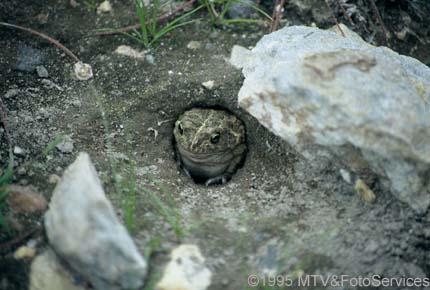Fauna
Fauna-01 Fauna-02
Fauna-03
Fauna-04 Fauna-05
See
also Elephants In Eritrea
 |
Fauna
Mammals and Reptiles
In the past, Eritrea was home to a large range of animals, including buffaloes,
cheetahs, colobus monkeys, elephants, giraffes, hippos, Nubian ibexes,
leopards, lions and waterbucks. With the loss of the forests and the decades
of war, many of these animals have disappeared.
Mammals commonly seen today include the Abyssinian hare, African wild
cat, black-backed jackal, common jackal, genet, grounds quirrrel, pale
fox, Soemmering´s gazelle and warthog. Primates include the vervet
monkey and hamadryas baboon.
Lions, greater kudus and Tora hartebeests are said to occur in the mountains
of Gash-Setit province, north of Barentu.
|
| In the Bure peninsula, dik-diks and dorcas gazelles can be seen. Less
common sightings include bushbucks, duikers, greater kudus, klipspringers,
leopards, oryxs and crocodiles. In the area between Awgaro and Antore, Eritrea´s
last population of elephants is said to roam. |
Birds
Eritrea´s range of habitats is surprisingly diverse, and its birdlife
is correspondingly rich. A total of 537 species of birds have been recorded,
including the rare blue saw-wing.
The isolated and uninhabited Dahlak Islands, and the rich feeding grounds which
surround them, attract large numbers of nesting sea birds frol all over the
Red Sea (and possibly also from the Meditreeanean and Gulf). Some 109 species
have been recorded on the islands, including the Arabian bustard and osprey.
Eritrea also lies within a popular migratory fly way. Hundreds of species of
wintering and migratory coastal and sea birds can be seen crossing between the
continents of Africa and Arabia.
On the Bure peninsula, the ostrich and Arabian bustard are commonly seen. Sea
birds include gulls, terns, boobies and, on the coasline and island, many species
of wader.
In the lush, evergreen, tropical forests in the Semenawi Bahri area north-east
of Asmera, birdlife is particularly abundant. Species include the near-endemic
whitecheeked turaco, and the Narina trogon.
Marine Life
Major marine ecosystems include the coral reefs, sea-grass beds and mangrove
forests. In the Red Sea, at least 129 species of coral are known to exist. Eritrea´s
coral is mainly found as "patch reef" extending from the surface to
around 15m to 18m; beyond this depth, coral development tends to be limited.
Lying on the northerly limits of the mangrove ranges, Eritrea is nevertheless
home to at least three, possibly four, species (Avicennia marina, Rhizophora
mucronata, Ceriops tagal and Bruguiera gymnorrhiza), which are found along the
coast and on the Dahlak Islands.
Five species of marine turtle have been recorde. Most common are the green
and hawksbill turtles; the leatherback is occasionally seen, and the loggerhead
and Ridley only rarely. The green turtle is quite often spotted around the Dahlak
Islands.
Dolphins are also frequently seen around the Dahlak Islands. Four species occur:
the common , humpback, bottelnose and spinner dophins. Spinners are the very
small type often seen in large groups. Shark species include the white and black-tipped
reef, mako, nurse, whale, hammerhead and tiger sharks.
The dugong, or seacow , is now considered endagered. The Eritrean and Sudanese
coastlines are thought to be home to at least half the 4000 to 5000 dugong estimated
to inhabit the Red Sea. Sightings of the dugong in the sea are rarre; most often
they are caught in the nets of fishermen.
According to Article 12 of the marine Reserves Act, spear guns are forbidden
in the waters of the Dahlak Islands, as is the collection of coral, shells or
any plant life from either the beaches or teh waters. Leaving litter of any
sort is also considered an offence, as is the disruption of the habitat of endangered
species such as turtle.
Source of the text: http://www.lonelyplanet.com
